The retired Los Angeles police captain who testified that the officers did not use excessive force in the Rodney King trial is set to testify as a defense expert in the upcoming George Floyd trial.
George Floyd Case
On May 25, 2020, George Floyd, who was a black man in handcuffs, died after Derek Chauvin, a Minneapolis police officer pressed his knee against Floyd’s neck as he said he couldn’t breathe. Chauvin and the other three officers who were present were fired and are scheduled to stand trial.
Chauvin is charged with unintentional second-degree murder and second-degree manslaughter. The three others, Thomas Lane, J. Alexander Kueng, and Tou Thao, are charged with aiding and abetting both counts.
Each of the former police officers will be tried separately.
Use-of-Force Expert
Former Minneapolis police officer Thomas Lane is represented by attorney Earl Gray. Gray filed a notice that he plans to call Greg Meyer as a use-of-force expert at his client’s trial.
Greg Meyer is a retired Los Angeles police captain who was employed by the Los Angeles Police Department from 1976 to 2006. Meyer is also an expert on police training, intervention, detention, and arrests.
Meyer offered testimony at the Rodney King federal civil trial in 1994. In 1991, Los Angeles police officers were trying to stop an unarmed King from speeding when he fled. After a high-speed chase, the officers used stun guns and beat King with batons. Bystander video of the incident led to increased concern over the effect of race on policing.
At the trial, Meyer testified that the officers did not use excessive force when they beat Rodney King in 1991. Meyer testified that the officers had not used excessive force because of police policy. Jurors awarded King $3.8 million in damages, but declined to award punitive damages.
Meyer has been critical of bans of neck restraint holds and upper-body control holds or “chokeholds.”
Meyer wrote an opinion piece for the L.A. Times in 1994. In his piece, Meyer blamed the City Council and board of police commissioners for stopping the use of chokeholds. Meyer explained that an upper-body control hold applies pressure to the carotid artery in the neck to render the subject unconscious. When chokeholds were banned, some warned that the next level of force would be the baton.
Meyer noted that after the chokehold ban, injuries to suspects had risen 661{d61575bddc780c1d4ab39ab904bf25755f3b8d1434703a303cf443ba00f43fa4} and injuries to officers had risen 521{d61575bddc780c1d4ab39ab904bf25755f3b8d1434703a303cf443ba00f43fa4}.
Meyer wrote;
“Police officers and jailers will continue to have violent confrontations with persons who choose to resist. And the public will grow tired of making millionaires out of convicted criminals and others who resisted arrest. The public must insist on a re-evaluation of police policy in a more rational policy-making process than Los Angeles experienced in the early 1980s. Law-enforcement leaders must adopt a more humane use of force on a scale governed by the severity of injuries that result from any given tactic.”
He continued, “If we can put a man on the moon and return him safely to Earth, why can’t we put a man on the ground and take him safely to jail?”




